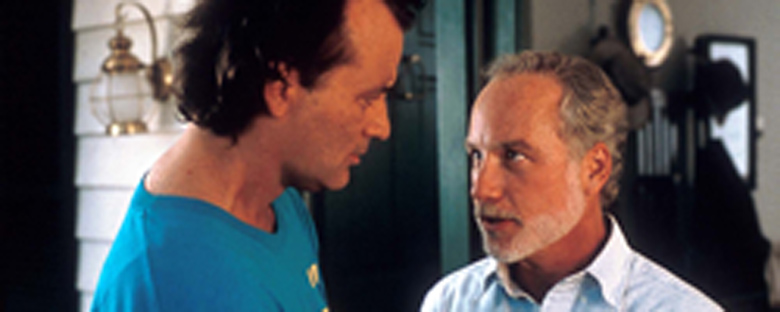Reviews
The question from which this witty, manic 1990s comedy takes its title—“what about Bob?”—can be interpreted in several different though essentially similar ways, the theme being: how will Bob—a highly phobic, potty, frenetic, obsessive-compulsive loser—get by in the real world? That the doyen of potty, frenetic loserdom known as Bill Murray plays Bob makes the question all the more worth asking.
The story is a simple one: just before leaving for a one-month vacation, award-winning psychiatrist Dr Leo Marvin sees new patient Bob Wiley for their one and only session. Assuming he has established enough of a doctor-patient relationship to sustain his new patient, Dr Marvin leaves for vacation only to be plagued by the highly-dependent Bob, who turns up on the psychiatrist’s holiday doorstep and proceeds to demand the attention of all those he encounters, including the long-suffering and occasionally neglected Marvin family.
It is an interesting set-up: an essentially serious subject matter (mental health) dealt with in a wholly comic manner. Considering briefly other well-known films to deal with mental health, One Flew Over The Cuckoo’s Nest had its moments of humour but remained serious, whilst Memento negated almost any humour for dramatic effect. What does the reference frame of humour in What About Bob? therefore provide us with?
Primarily, it removes the focus from Bob’s mental problems and establishes in the viewer’s mind the relationship between patient and doctor. Far from the orthodox relationship of enquiring, controlling doctor and on-the-couch, out-of-control patient, the tables are turned and Bob begins to control the situation, bringing with his control the break-down of the doctor-patient relationship.
To find some possible meaning in this, let us consider the way in which psychiatry, specifically psychoanalysis, functions. In the psychoanalyst’s room, psychoanalysis works because the counseled seeks reality in their relationship with counselor, despite the artificiality of the circumstance. To function at all, psychoanalysis depends on the ability of the counseled to suspend belief and disbelief simultaneously such that they can explore their problems and (hopefully) remedy them. To put this another way, the analytic relationship belongs simultaneously to two frames of reference: the inner frame in which the analyst and the patient communicate, and the outer frame in which two people who have otherwise no connection agree to engage in a very specialised extended conversation.
From the perspective of film, this is all faintly familiar: indeed, the analogy between psychoanalysis and film needs hardly to be drawn. To enjoy a film—to get anything out of it at all—we have to subdue our literal mind in two ways: we have to forget that the characters are actors while not believing the action to be real. Thus, What About Bob? can be seen as a meditation on the relationship between the film-maker (or psychiatrist) and the film-viewer (or patient), in which the film-maker/psychiatrist leads the film-viewer/patient to greater awareness through his skill and training as a practitioner.
Directed by Frank Oz, who—aside from the fun he must have had making The Little Shop of Horrors and Bowfinger (both with Murray’s one-time Saturday Night fellow star Steve Martin) amongst others—has contributed his own bit of sage advice as the voice of Yoda in the Star Wars series, What About Bob? is an amusing offering whose serious undertones reflect on the relationship between film and viewer through the analogous relationship of psychiatrist and patient. As a comedy, however, What About Bob? also satisfies the obvious prerequisite—which is to say it succeeds in being funny. As such, it is far from being only a high-minded meditation on the intricacies of film and its audience, but also another wonderful display from the archetypal loose cannon in need of some help, Bill Murray.
We don’t do comments anymore, but you may contact us here or find us on Twitter or Facebook.



